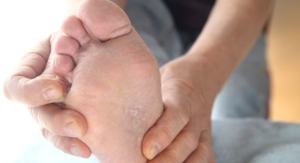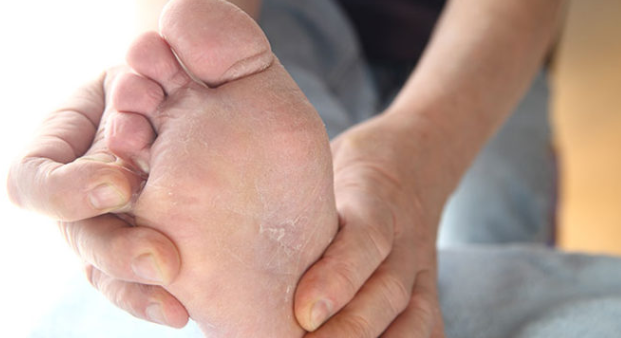Pruritus is a medical term used to refer to itchiness in the body. Irritation on the skin surface is often the primary cause for the itchy soles of feet. Feet tend to be itchy as they are often placed in very sweaty situations.
Your footwear has a direct impact on the amount of sweating that will occur on your feet. Situations that could cause feet itchiness include:
- Infectious fungi, bacteria, parasites, or viruses
- Exposure to high moisture content
- Irritants more so when walking barefooted
- Dry environments known to cause dryness in your feet
Itchy soles of feet are traditionally not a source of concern though they could indicate the presence of a serious medical condition. Itchiness in this area may also be an indication that you have a deep internal disease. You can find relief from anxiety and worry by differentiating between the symptoms that are serious and those that are not.
Itchy soles of feet meaning, Superstition
There are different kinds of superstitions about different things. Many of the superstitions have been around for very many years. The superstitions tend to be so old that it becomes hard to tell whether they are factual or not.

Some of these superstitions touch on the issue of itchy feet. There are cultures that believe itchy soles of feet are an indication that something is about to happen. Some say that you will embark on a long journey in the near future.
A left itchy foot in some cultures indicate that you will start a journey that will have a very sad ending. An itchy right foot mean that the trip will end at a place where you will feel at ease, or at home. There is another superstition implying that the itchy foot is an indication that you cannot be able to sit still.
Some cultures believe that this itchiness is a sign that there could be someone talking about you. Others believe that it means you will get new shoes that will not be a perfect fit. Some cultures believe that it is an indication that one of your family members will pass away.
Itchy soles of feet NHS
Itching is normally caused by a condition that is affecting your skin. There are situations where it may indicate a more serious underlying condition. It could also be difficult to identify what is causing the itchiness.
1. Skin conditions
Skin conditions known to cause skin itchiness include:
- Prurigo—small blisters on your feet soles that tend to be very itchy
- Dry skin
- Folliculitis—condition that comes about when your hair follicles are inflamed
- Eczema—characterized by itchy, red, flaky, and dry skin
- Contact dermatitis—skin inflammation common when you are exposed to allergens or irritants
2. Allergies and skin reactions
Itchy soles of feet can sometimes be caused by environmental factors, allergens, or irritants. They may include:
- Sunburn
- Cosmetic ingredients
- Prickly heat
- Certain metals like cobalt
- Allergy to certain medications
- Rubber
Itchy soles of feet at night
Itchy feet soles can be caused by dry skin as a result to weather changes, underlying skin conditions, or too much scrubbing. Treatment will often be based on the causative factors.
It can be very annoying having to persistently scratch your feet due to itchiness. Severe itching may end up distracting you from your daily tasks. Scratching can end up disturbing your sleeping patterns if it is not controlled early on.
The itchiness on your feet soles could be an indication that you have a skin disorder. You have to know the reason behind the itchiness before you can attempt to administer treatment.
What causes itchy sole of feet?

The itchiness can result from a number of causes. They include:
1. Medical conditions
Itching attributed to medical conditions could be due to an increase in neurotransmitter serotonin production. Your doctor could thus recommend a reuptake of selective serotonin inhibitor medicine as a way of dealing with the itchiness. Underlying conditions known to cause this problem include:
- Thyroid gland disease
- Liver disease
- Kidney disease
- Cholestasis
- Polycythemia Rubra Vera
- Cancer
2. Skin conditions
Skin conditions that can cause itchy soles of feet will include:
- Pest infestations like scabies or lice
- Allergic contact dermatitis
- Dry skin
- Athletes foot
- Bug Bites
- Atopic dermatitis
- Scars
- Juvenile plantar dermatosis
3. Exposure to irritants
Irritants are any substances that can cause a reaction in or around your body. An irritant can also be a topical ointment or medication you are using to treat another condition. Medications that can cause itchiness include:
- Statins
- Narcotics or opioids
- ACE inhibitors
- Morphine sulfate
Itchy soles of feet, palms, and hands
Itching on your hands, palms, and feet can be very annoying. Persistent itching has the potential to distract you from your daily routine. It may also lead to skin damage.
Causes of this itchiness vary from medications to skin disorders. Skin disorders that have been known to cause this problem are:
- Dry skin
- Stress
- Medications
- Sweaty sock syndrome
- Medical conditions
- Irritant contact dermatitis
- Athletes foot
- Psoriasis
Itchy soles of feet during pregnancy
Increased blood supply to your feet is the primary cause of itchy soles of feet when pregnant. You should not have to worry about mild itching. Severe itching on the other hand could be an indication that you are suffering from obstetric cholestasis.
It is a condition of the liver that affects one in every one hundred pregnant women. It is serious and will require you to get urgent medical attention. Itching on your feet soles is likely to start when you are in your twenty-eighth week of pregnancy.
Some women will experience itching that will then be accompanied by a severe rash. Itching could become unbearable and persistent. It often tends to worsen during evening hours.
Additional symptoms may include:
- Pale bowel movements
- Dark urine
- Jaundice
Itchy soles of left or right foot
The human body has been subjected to very many superstitions over the years. Many of these beliefs have been passed down from one generation to the next. The superstitions often suggest that a body part possesses the ability to forewarn real life events.
Many of these beliefs are typically concerned with the feet.
1. Left feet superstitions
Left feet itching is often associated with negativity. It is in many cases associated with traveling where a journey may not have a pleasant ending. Itching on your left foot sole means that you may experience some losses in the course of your journey.
It could also imply that you will receive a cold welcome on arrival. Left foot itching is therefore believed to bring failure and disappointments.
2. Right foot itching
Often associated with positivity. Many beliefs state that itching on the right foot is an indication that you will soon be embarking on a journey. Your journey will also be profitable.
Some state that you will be welcomed with open arms on arrival. Superstitious people should therefore prepare to embark on a journey when they experience a tingling on the right foot sole.
Itchy soles of feet no rash
Itchiness on the soles of your feet with no visible rash is often associated with a liver disease. Generalized or widespread itching from a liver disease may appear before any other symptoms of the liver disease. The itchiness is mostly concentrated on your feet soles and palms of your hands.
It gets worse during late evening hours and at night. You will often notice that no lesions or rashes are present. It can only occur when the scratching act itself damages your skin.
Your GP may need to carry out tests to establish what is behind the itching. This is common in situations where liver disease is not the apparent cause for itchiness. A liver ultrasound may be necessary to determine whether there are changes in your bile levels.
How to cure, stop itchy feet
Doctors will often treat itchy soles of feet depending on the causative factors. Itchiness caused by an allergic reaction calls for complete avoidance of the products in question. Treatments to help relieve itching includes:
- Prescription medication, e.g., tricyclic antidepressants, gabapentin, or SSRIs can be of benefit to certain patients
- HI, blocker antihistamines like Benadryl assists in relieving itchiness. Antihistamines have been known to contain untoward side effects. Seniors may have to avoid the antihistamines.
- Topical anti-itch medication comes in handy in reducing localized itching on your skin surface.
- Antifungal creams or sprays can be used by people who have athletes foot.
Itchy soles of feet prevention
Practicing good foot care habits will assist in reducing itchy feet. They can also help do away with some of the causes, e.g., fungal infections. You will need to ensure you wear shoes when stepping on gym floors or any other shared shower facilities.
You could also practice these measures:
- Wear properly ventilated shoes
- Do not wear socks and shoes until you confirm that your feet are completely dry
- Wear socks made of cotton wool
- Regularly wash your feet using mild soap. Make sure you pay attention to the areas that are between your toes
Home remedies for itchy feet
- Tea tree oil: comes with properties to ensure that the bacteria or fungus causing the itchiness will not start to spread. You have to soak your feet in a warm bath of water that has been combined with forty drops of this essential oil. Ensure you dry your feet properly before applying a few drops of this oil to your now dry
- Himalayan crystal salt and apple cider vinegar: the combination creates an acidic environment making it impossible for bacteria or fungi to thrive. Combine the two ingredients in a bath of hot water and soak your feet in the water for seven minutes. Ensure you dry your feet after the foot bath.
- Baking soda: make sure you sprinkle a small amount of baking soda on your shoes and socks each day. It is more of a precautionary step than a curative one. The baking soda will soak up all the excess moisture present in your socks and feet.
Article Resources:
- org/living-with-diabetes/complications/skin-complications.html
- com/medicalpubs/diseasemanagement/dermatology/pruritus-itch/
- clevelandclinic.org/disorders/ringworm/hic_athletes_foot_jock_itch_and_ringworm.aspx
- net/practicaldermatologypeds/pdfs/PDpeds0810_JPD%20Fea.pdf
- https://www.everydayknow.com/what-are-the-superstitions-about-itchy-feet/

